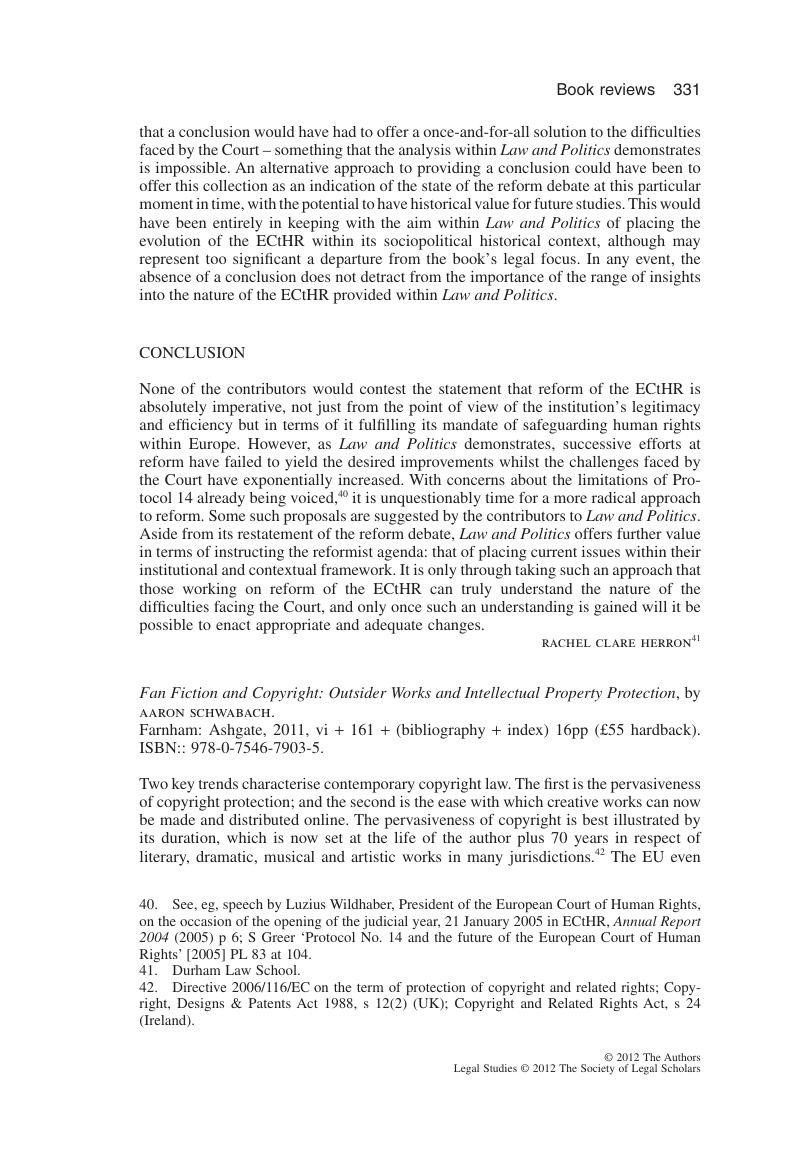No CrossRef data available.
Published online by Cambridge University Press: 02 January 2018

42. Directive 2006/116/EC on the term of protection of copyright and related rights; Copyright, Designs & Patents Act 1988, s 12(2) (UK); Copyright and Related Rights Act, s 24 (Ireland).
43. Directive 2011/77/EU on the term of protection of copyright and related rights.
44. A number of organisations collaborate in promoting an annual ‘Public Domain Day’, celebrating those works which are no longer protected by copyright law. Each year, a list of authors so affected is published at http://www.publicdomainday.org, and events take place at universities and libraries across the world.
45. Lipton, J ‘Copyright's twilight zone: digital copyright lessons from the vampire blogosphere’ (2010) 70 Maryland Law Review 1 Google Scholar ; Tushnet, R ‘Copyright law, fan practices and the rights of the author’ in Grey, J (ed) Fandom: Identities and Communities in a Mediated World (New York: New York University Press, 2007)Google Scholar .
46. The best example being footnote 80 on page 47, which attaches to the word ‘inconceivable’ in the main text a beloved quote from the 1987 film The Princess Bride. At the time of writing, the scene in question is available on YouTube as a six-second clip: http://www.youtube.com/watch?v=G2y8Sx4B2Sk. Another is the gentle teasing of his own interests in footnote 29 on page 69: ‘I could offer pages of examples and argument here, but that's something for a fan forum.’
47. Sadly, this is merely this author's hypothetical example. Anyway, this would be RPF (Real People Fiction), which is a parallel category.
48. Actually, there are 431 stories on FanFiction.net based on To Kill A Mockingbird: http://www.fanfiction.net/book/To_Kill_a_Mockingbird/
49. Figures published on http://ffnresearch.blogspot.com
50. Again, in order to provide a good example here, one must guess at the reading habits of the membership of the Society of Legal Scholars, but if I say Kirk/Spock, Holmes/Watson and Harry/Draco, hopefully that causes appropriate bells to ring for most.
51. L Grossman ‘The boy who lived forever’Time, 7 July 2011, http://www.time.com/time/arts/article/0,8599,2081784,00.html
52. Salinger v Colting (2009) 64 F Supp 2d 250 (Southern District, New York).
53. 17 USC §107.
54. Much of this can be traced to a journal article: Leval, P ‘toward a fair use standard’ (1990) 103 Harvard Law Review 1105 CrossRefGoogle Scholar, and its use by Justice Souter in Campbell v Acuff-Rose (1994) 510 US 569. (This was the second-most interesting thing about Souter's opinion; the most interesting thing was, of course, the inscription in the bound law books of the lyrics of 2 Live Crew's alternative version of Pretty Woman that so exercised the author of the original.)
55. Warner Bros v RDR Books (2008) 575 F Supp 2d 513 (Southern District, New York).
57. ‘Digital opportunity: a review of intellectual property and growth’, http://www.ipo.gov.uk/ipreview-finalreport.pdf
58. Directive 2001/29/EC on the harmonisation of certain aspects of copyright law in the information society, Art 5(3)(k).
59. ‘Digital opportunity’, above n 57, ch 5.
61. 17 USC §1201(a)(1).
62. Jones, R ‘From shooting monsters to shooting movies: machinima and the transformative play of video game culture’ in Hellekson, K (ed) Fan Fiction and Fan Communities in the Age of the Internet (Jefferson, NC: McFarland, 2006)Google Scholar ; Reynolds, G ‘All the game's a stage: machinima and copyright in Canada’ (2010) 13 Journal of World Intellectual Property 729 CrossRefGoogle Scholar ; see also the special issue of the Journal of Visual Culture, volume 10(3) (2011).
63. Duke University Press, 2011.
64. Oxford University Press, 2009.